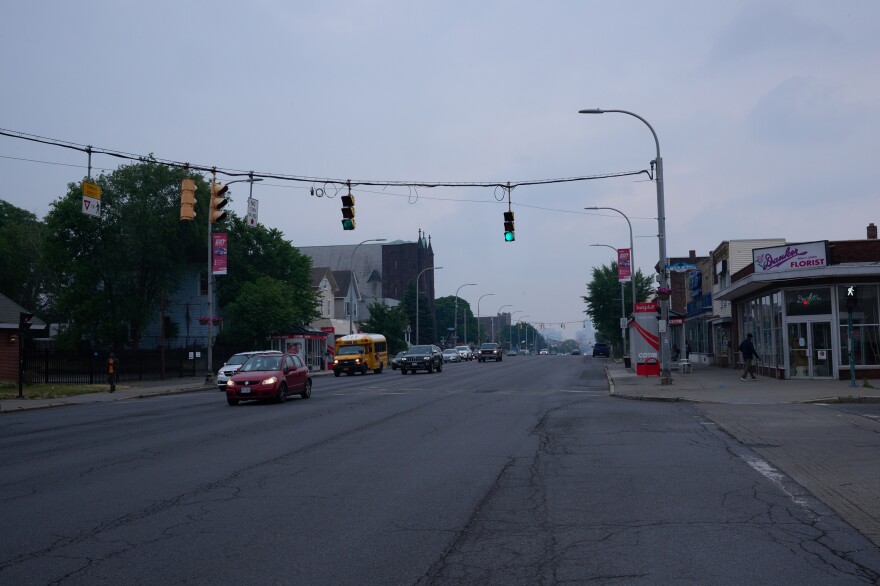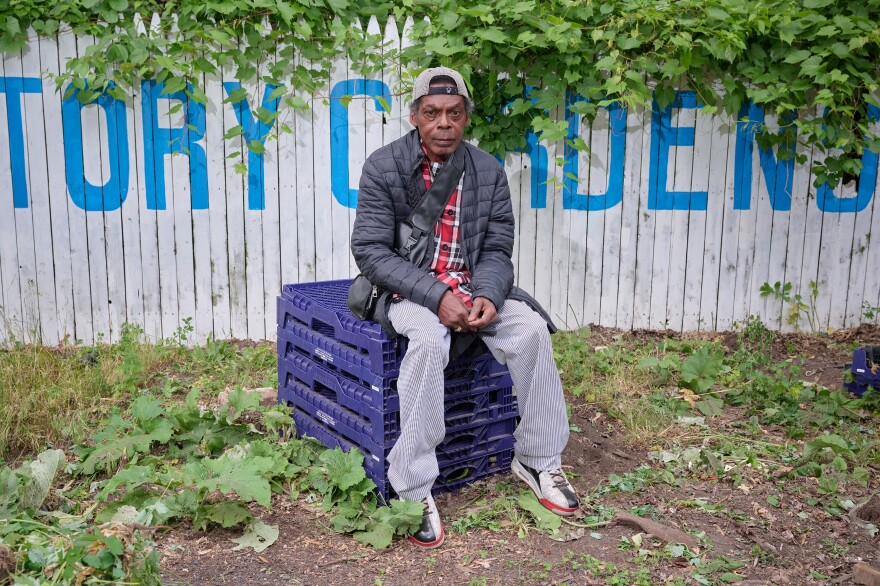Updated June 20, 2023 at 11:07 PM ET
Johnson Coronel hopes Albany, N.Y., is the end of the line. He's 26 years old. A few months ago, he and his brother left Venezuela for the U.S., hoping to escape government violence at home.
They requested asylum at the Texas border.
They lived in two shelters there. In Brownsville, then in San Antonio. They lasted four days with a relative in Boston before he said there was no room. They wound up in a New York City shelter, where Coronel says there were 12 people per room. When officials told them Albany would be less crowded, they immediately agreed to go.

"It's a lot of instability," says Coronel. "But the situation in Venezuela has gotten impossible. You can't walk down the street without a government official shaking you down for money every couple of blocks. We just want to work and live in peace."
New York City has received over 60,000 migrants and asylum-seekers in the last year or so. Officials there say they are overwhelmed and have begun sending people to nearby communities.
It's a policy that is increasingly concerning to advocates. While places like Albany, a sanctuary city, have welcomed new arrivals, many localities have expressed hostility toward immigrants.
"In these non-sanctuary cities, folks are very much in fear of getting deported," says Micky Jimenez, executive director of the nonprofit Capitol District Latinos. "If they work there, they go to work, and go back home. They are very much afraid."
Local nonprofits like hers are doing their best to step up, but they say they, too, are stretched thin.
New arrivals, and the lack of resources to help them, have caused tension
New York has become a battleground for immigration, and relations between the city, neighboring towns and activists have become increasingly acrimonious.


"They're all sanctuary cities until they have to be sanctuary cities," says Peter Crummey, a Republican and town supervisor of Colonie.
Located 20 minutes away from Albany, the village of Colonie is not a sanctuary city. So Crummey says he was blindsided when, on Memorial Day weekend, New York City sent a bus with 24 migrants to his town. He's suing New York, but he says he's also infuriated at the lack of guidance from the Biden administration and Congress.
"The federal government has created chaos in our country by not responding and making a plan for these folks," he says. "The solution lies at the feet of the federal government. Because immigration is decidedly a federal issue. It's not a town issue. Or a village issue."

It's a sentiment that is echoed in communities throughout the area. Some residents even say they worry about the new arrivals exacerbating existing tensions.
Efren Rojas works as a mechanic in Rockland County, N.Y., about two hours south of Colonie.
"I've always overheard people talk badly about Hispanics," he says. "No matter where you come from, your family can be here for hundreds of years, they will still see you as from another country. You're skin is a little dark, and you will make people uncomfortable."
Rockland's population is 78% white and nearly 19% Latino, according to 2022 U.S. Census figures. It was granted a preliminary injunction to keep any additional migrants from being placed there. The New York Civil Liberties Union has filed suit against the county.
Rojas says he's not opposed to folks migrating. After all, he did it from Mexico when he was a teenager. He was undocumented for years — he now has his papers — but he thinks the federal government should not be offering them assistance.
"I was always scared that if I asked for help, I could get deported. I'm not resentful about that. I came to work, not to ask for help," he says. "They're abusing the system."


At a nearby supermarket parking lot, Anthony Gerome says he's concerned about the costs of taking people in. He points out that the U.S. economy is not great right now.
"We can't afford it," he says. "We have too many people in the United States that are U.S. citizens, veterans of war and so on that need our help desperately."
Gerome says he feels compassion for people asking for asylum in his area, but he says people in this town did not sign up to take on and take care of asylum-seekers.
"People come to the suburbs thinking they're going to have a better life and a safer environment. Because it's not only a fiscal problem. It's a safety issue. We don't know who these people are," Gerome says.
Actually, people who have entered the U.S. recently as migrants or asylum-seekers have been screened by immigration authorities and allowed to pursue their cases from within the U.S.
But, Gerome says, he doesn't trust it.


Looking for help from overwhelmed systems
Hostility toward immigrants in some of the towns where they are being bused is alarming to many advocates and lawmakers. During a judicial hearing over Rockland and Orange County's executive orders banning any more migrants from coming in, White Plains federal Judge Nelson Román said the bans were reminiscent of "Jim Crow law. Not that I'm saying it is."
Dan Irizarry is chairman of Capitol District Latinos and acknowledges the challenges. "We can greet them, we can clothe them, we can feed them to a degree," Irizarry says. "But then what happens to them once they try to assimilate into this local area that's not really friendly to them at all?"


Throughout New York state, organizations like his have been stepping up to help. The list of comprehensive services includes a food pantry, English classes, clothing donations and even partnering with a local hospital to offer mammograms.
But the program's director, Micky Jimenez, estimates the number of people they serve has increased by 70% in the last year.

"We need funding. There is no way that we can continue to provide the level of services that we are providing," Jimenez says. "You know we're blessed with the incredible volunteers we have. But they're getting tired, too."
A few miles south, the community organization Albany Victory Gardens also provides help to migrants. "It's America. You're supposed to help each other out," says Linda Pasqualino as she waited to get her fruits and vegetables. "My grandmother came here from Czechoslovakia when she was 7. This is all politics; they're using people as weapons."
Albany Victory Gardens President Mitchell Keyes says he doesn't understand the outrage. He says anyone who walks through Albany will notice the "Help Wanted" signs. "There's a lot of jobs out here. And ain't nobody taking them. So if an immigrant comes and signs for a job he's qualified for, why not hire him?" he asks.


It's not that easy. Johnson Coronel, the 26-year-old Venezuelan who recently arrived, says he's noticed those stores with the "Help Wanted" signs Keyes mentioned. Sometimes he and his friends from the shelter go into those stores, asking for work.
They are told no one speaks Spanish, or they are asked for a work permit — which no one has yet, Coronel says. With immigration courts backed up, getting a permit to work could take as long as two years.

At least for now, he is stuck. Again. No income, living in the shelter, in a sanctuary city surrounded by towns where a lot of people have made it clear they do not want migrants like him there.
"We're tired," Coronel says. "One day we're here, the next day we're there. It's time to say, 'This is it. We're staying here. This is home.' "
Copyright 2023 NPR. To see more, visit https://www.npr.org.



